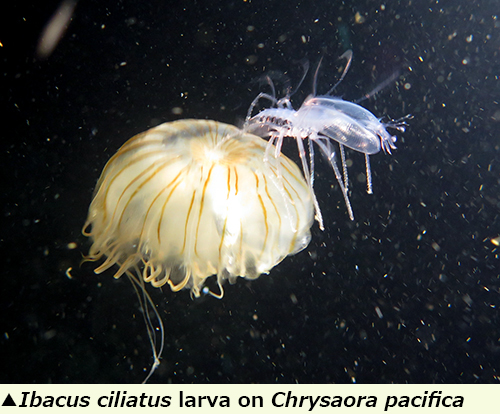We welcome you joining our laboratory!
Let's take a closer look at the marine invertebrate world!

One of the most beautiful, interesting and mysterious animals in the sea is jellyfish. People enjoy seeing this animal in a photograph, aquarium, and even underwater. At the same time, it is also one of the most dangerous and troublesome animals in the sea. Fishermen have a trouble because their fishing nets are often filled with jellies which are going to be waste. Sometimes people are killed by a venomous jellyfish.
In the wild, jellyfish plays a role of important food for fish and shellfish. Many fish juveniles and lobster larvae are known to rely on jellyfish for nutrients. Jellyfish contains proteins and fats which are essential for fish and shellfish to survive and grow. Even in a tank, these animals can be grown with feeding only on jellyfish.
We are studying the role of jellyfish in the wild as well as the way of utilising jellyfish in fish and shellfish aquaculture. No one have tried to utilise jellyfish in the aquaculture field so far, even though jellyfish is known to contain good nutrients. Our research could be a big challenge, but will bring us a great outcome. Let's have a great and exciting research together!
Our current interest
- * Symbiotic association between gelatinous zooplankton and crustaceans
- * Nutritional compositions of gelatinous zooplankton
- * Swimming and feeding behaviours of decapod larvae
- * Taxonomy on marine invertebrate larvae collected from the wild
- * Embryonic and larval development of marine invertebrates
... we have more ideas, will be updated soon.
We welcome excellent students from all over the world!
Master's and the doctoral courses in our laboratory are suitable for students who are interested in taxonomy, developmental biology, aquaculture, biodiversity, ecology, and evolution of marine invertebrates. Students are able to concentrate on a 2-years and 3-years research projects for the master's and doctoral students respectively using multiple techniques of culture system, microscopic analyses, molecular analyses, field surveys including offshore cruises, and so on. Some of our research projects are a part of international collaboration, or R&D with private companies.
Language mainy used in this laboratory is English. Prospective students must have their advanced English speaking and writing skills.
Students who have experiences of studying marine biology, aquaculture, and the related fields are most encouraged to enroll. Highly motivated students who do not have any related background are also welcome.
Contact
Dr. Kaori Wakabayashi (profile)
E-mail:kaoriw(at)hiroshima-u.ac.jp
